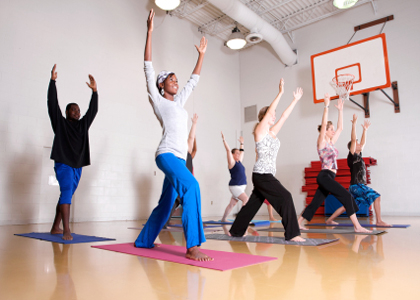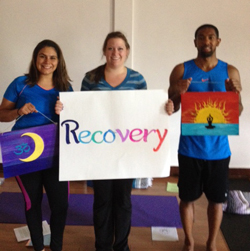Trauma-Sensitive Yoga
Behavioral Health Treatment
Real Bodies. Real Lives. Real Yoga.
Our Model:
Each series of classes is co-facilitated by a certified yoga instructor and a counselor. Gentle poses, combined with breathing and relaxation techniques, help participants learn to listen to their bodies and make healthy choices for body, mind and spirit. This is an effective evidenced-based, behavioral health treatment specially designed to reduce symptoms of trauma. Classes are available in multiple languages as well.
Check out our article in Elephant Journal – “Trauma Sensitive Yoga-it Works“.
Join a Befriending the Body™ Trauma Sensitive Yoga Class!
Our classes are being held in-person. See more details about our classes, and how we are taking safety precautions on our Events page.
For more information on our Befriending the Body™ Trauma Sensitive Yoga series, please call us at (303) 894-8000 (English) or (303) 718-8289 (Español)
Downloadable postcards available here – Befriending the Body™ Trauma Sensitive Yoga postcard – English & Spanish
Our instructors and counselors
Classes Are Designed with Participants in Mind
ALL BODIES • ALL ABILITIES • ALL LEVELS |
BENEFITS OF YOGA |
|
|
Each series is customized for a particular group of participants.
Befriending the Body™ Trauma Sensitive Yoga Research Summary
Staff collected, completed and validated evaluations from 151 participants of the Befriending the Body™ Trauma Sensitive Yoga program who attended in 2014-2015.
To measure the effectiveness of the series, participants completed pre- and post- evaluations for the Trauma Symptom Checklist (TSC-40), Scale of Body Connection (SBC), and Quality of Life Enjoyment and Satisfaction Questionnaire (Q-LES-Q-SF) measurement instruments. The following outcomes were demonstrated:
- Trauma Symptom Checklist – a 40-item self-report measure that evaluates symptomatology in adults associated with childhood or adult traumatic experiences. It measures aspects of posttraumatic stress and other symptom clusters found in some traumatized individuals. The instrument consists of six subscales: Anxiety, Depression, Dissociation, Sexual Abuse Trauma Index (SATI), Sexual Problems, and Sleep Disturbance, as well as a total score. The TSC-40 is measured on a scale from 0 (never) to 3 (often), and subscale scores are a sum of participant scores for relevant questions.
The TSC-40 results revealed statistically significant (p < 0.05) decreases in the following symptoms:
- Dissociation (raw score decreased from 5.49 to 3.85)
- Anxiety (raw score decreased from 6.71 to 5.27)
- Depression (raw score decreased from 9.05 to 6.43)
- Sexual Abuse Trauma Index (SATI) (raw score decreased from 4.93 to 3.74)
- Sleep Disturbance (raw score decreased from 9.00 to 6.78)
- Scale of Body Connection – a 20-item self-report measure, designed to assess body awareness and bodily dissociation in mind-body intervention research. The SBC is measured on a scale from 1 (not at all), 2 (a little bit), 3 (some of the time), 4 (most of the time) to 5 (all of the time), and subscale scores are an average of participant scores.
The SBC results revealed statistically significant (p < 0.05) changes:
- Body Awareness (mean score increased from 3.35 to 3.64)
- Body Dissociation (mean score decreased from 2.07 to 1.90)
- Quality of Life Enjoyment and Satisfaction Questionnaire – a self-report measure designed to assess the degree of enjoyment and satisfaction experienced by participants in various areas of daily functioning, including feelings/emotions, physical health/activities, leisure time activities, health activities, and social relations. Participants indicate degree of enjoyment and satisfaction on a scale of 1 (not at all) to 5 (frequently or all the time), in each of the aforementioned areas.
The Q-LES-Q-SF revealed relevant, but not statistically significant changes in overall life satisfaction (mean score increased from 3.73 “fair” to 4.08, “good”)





